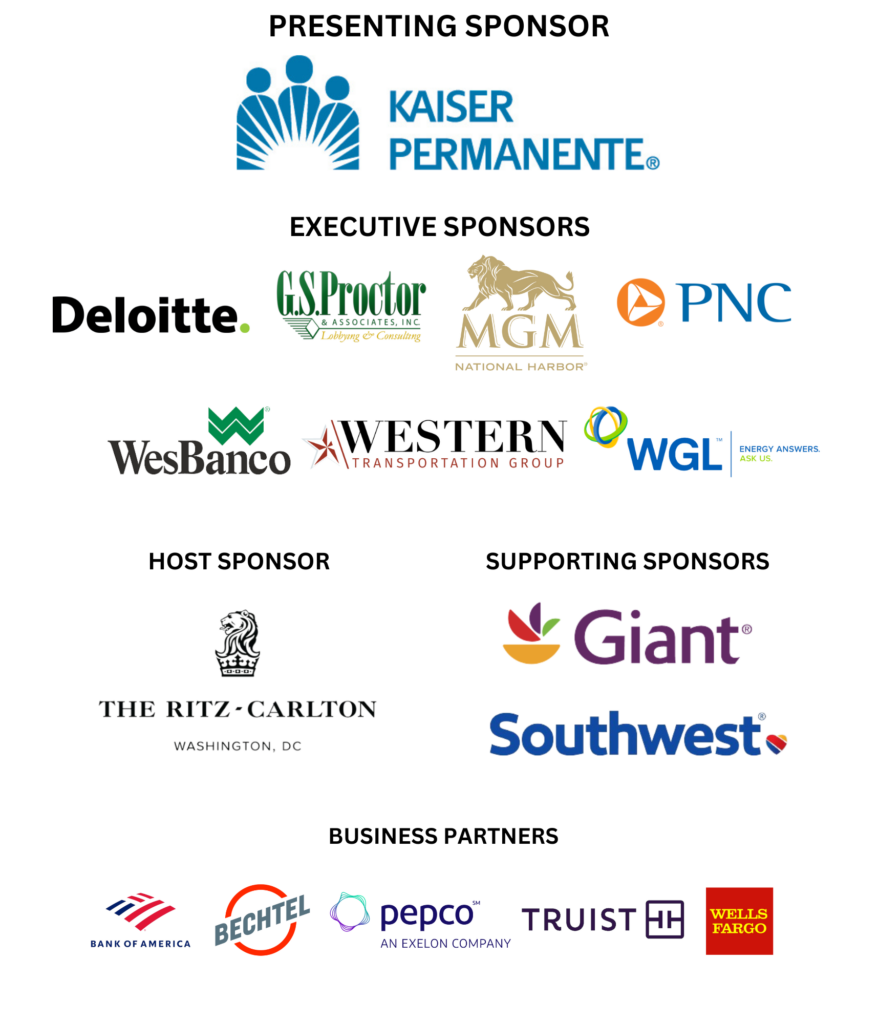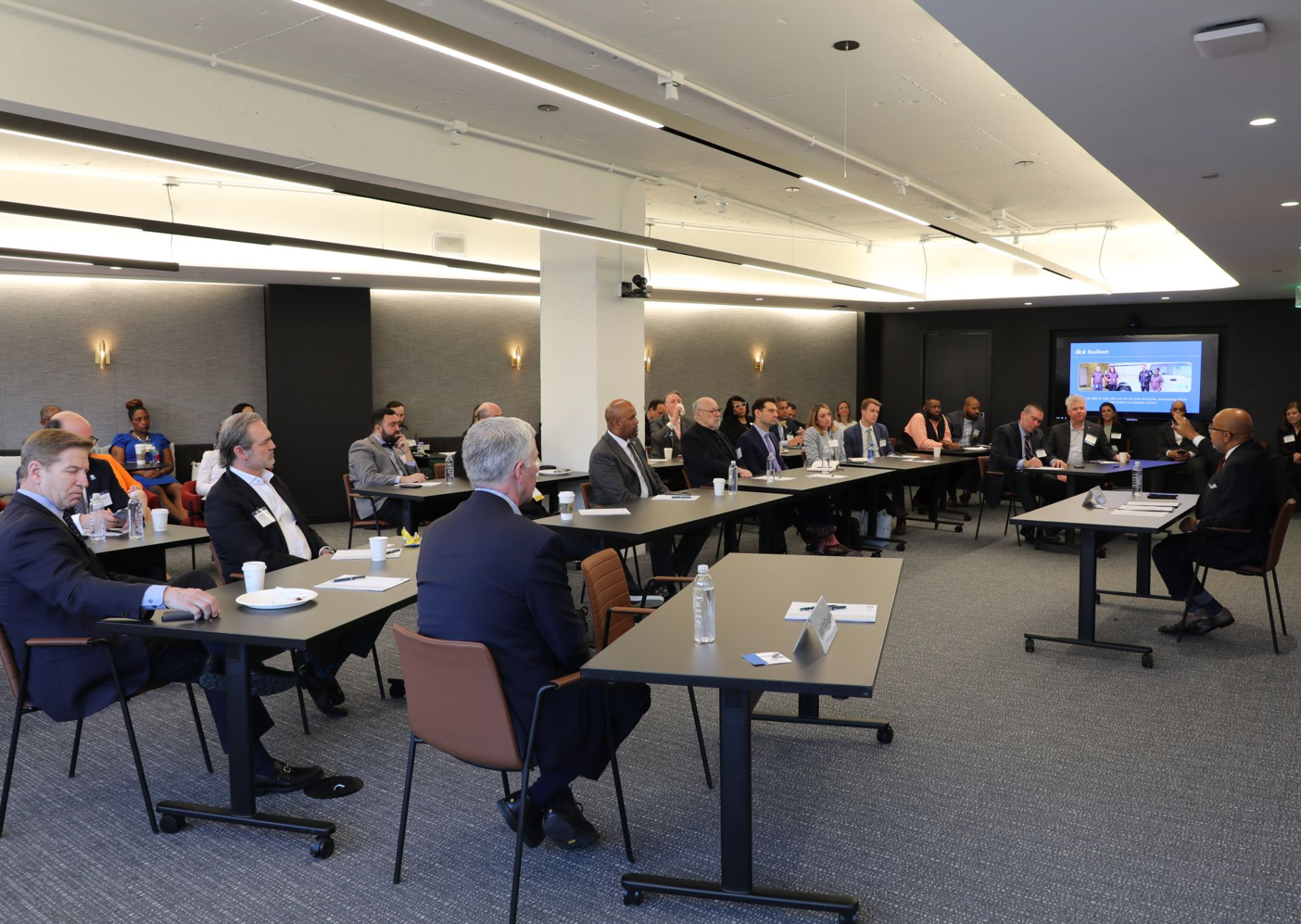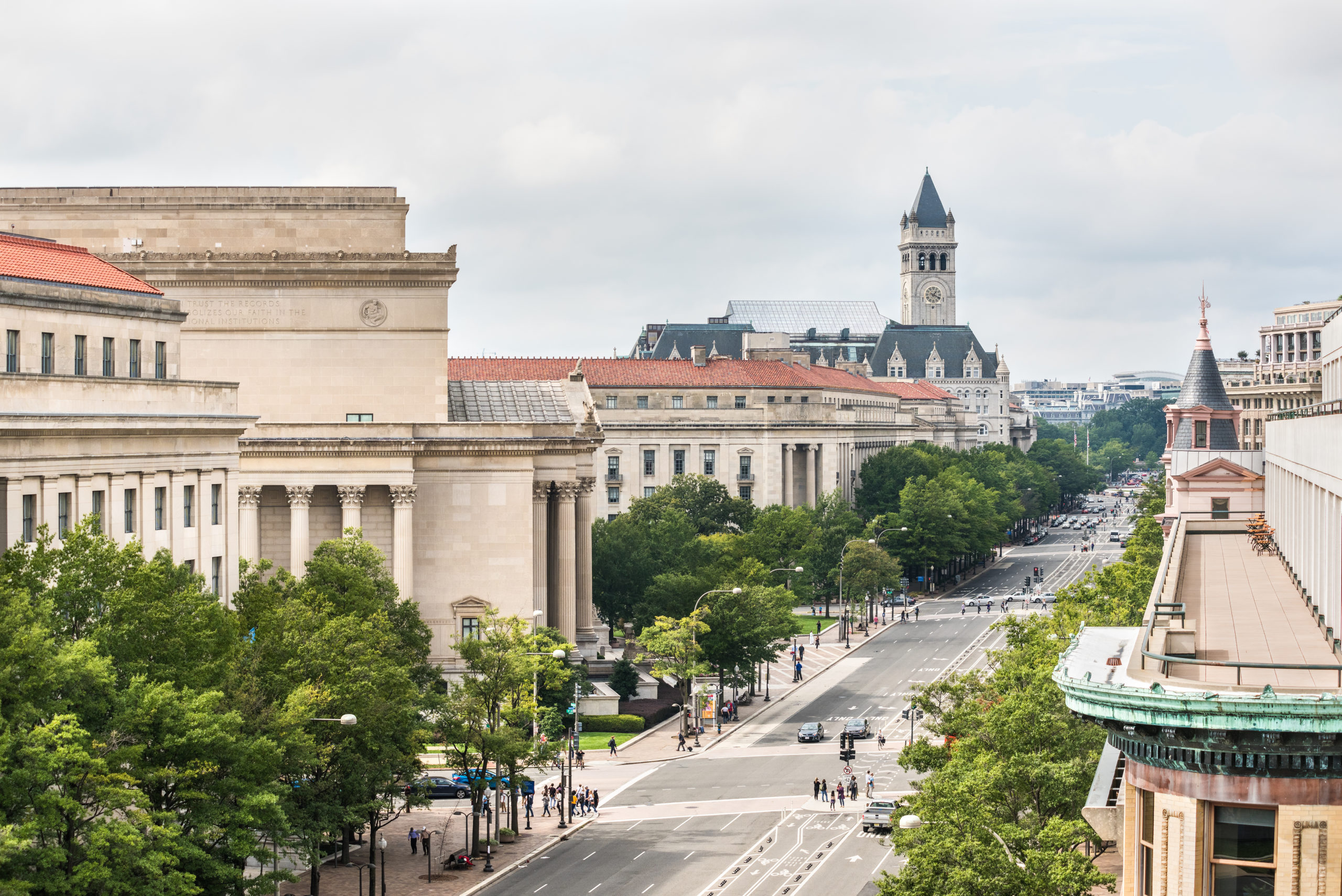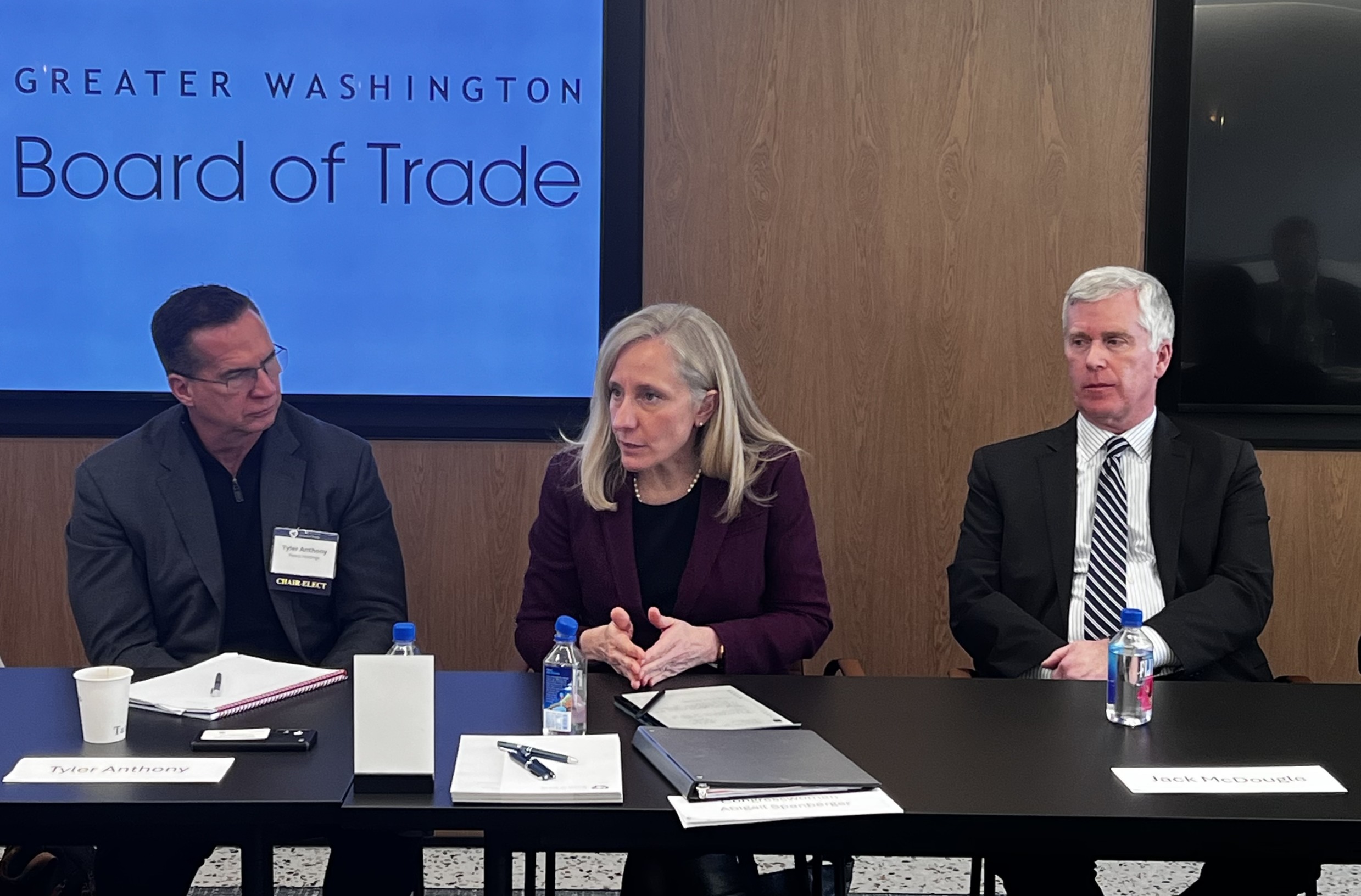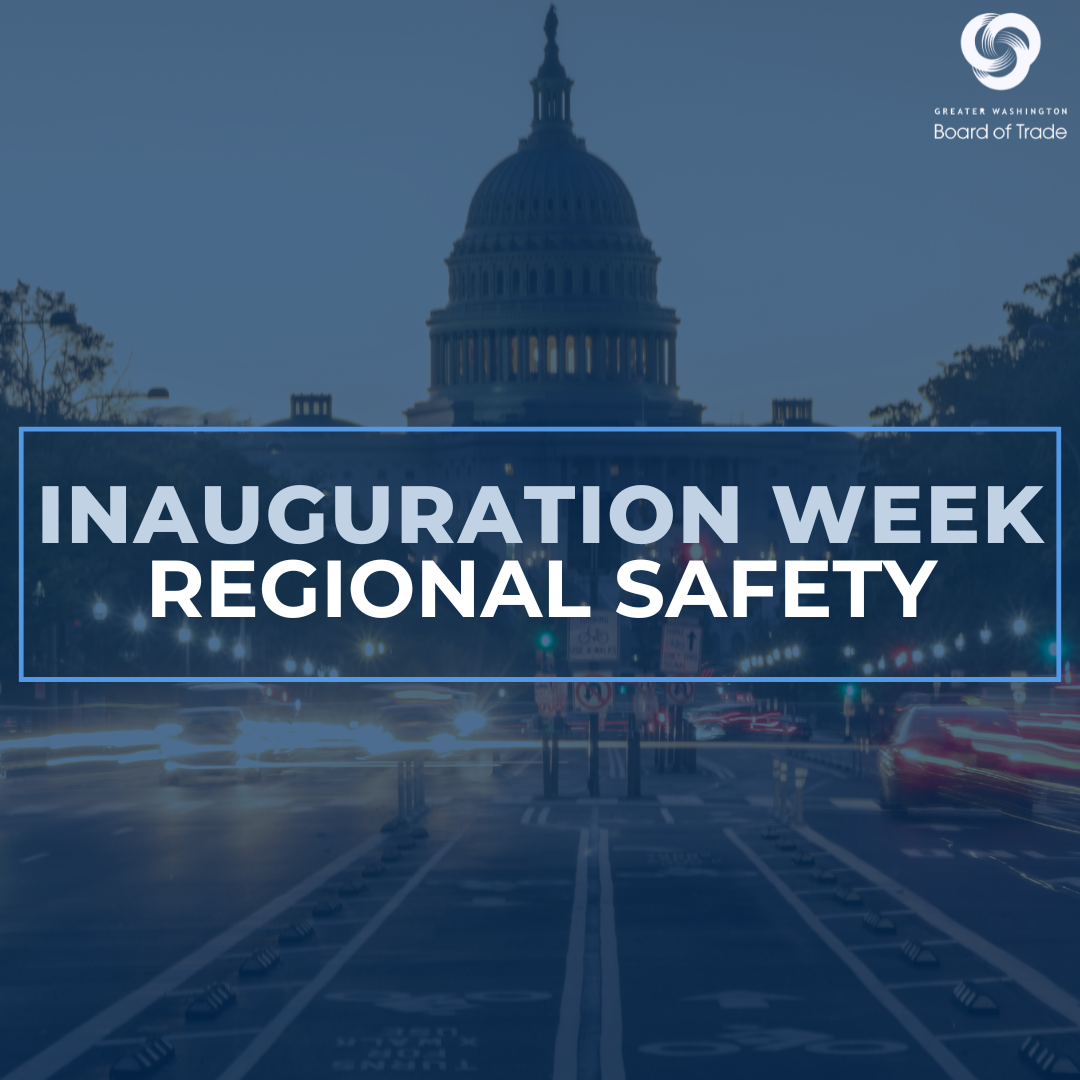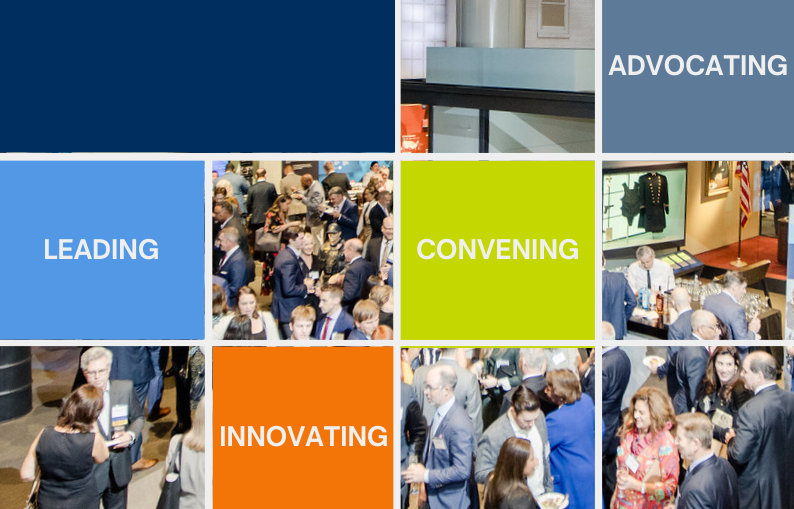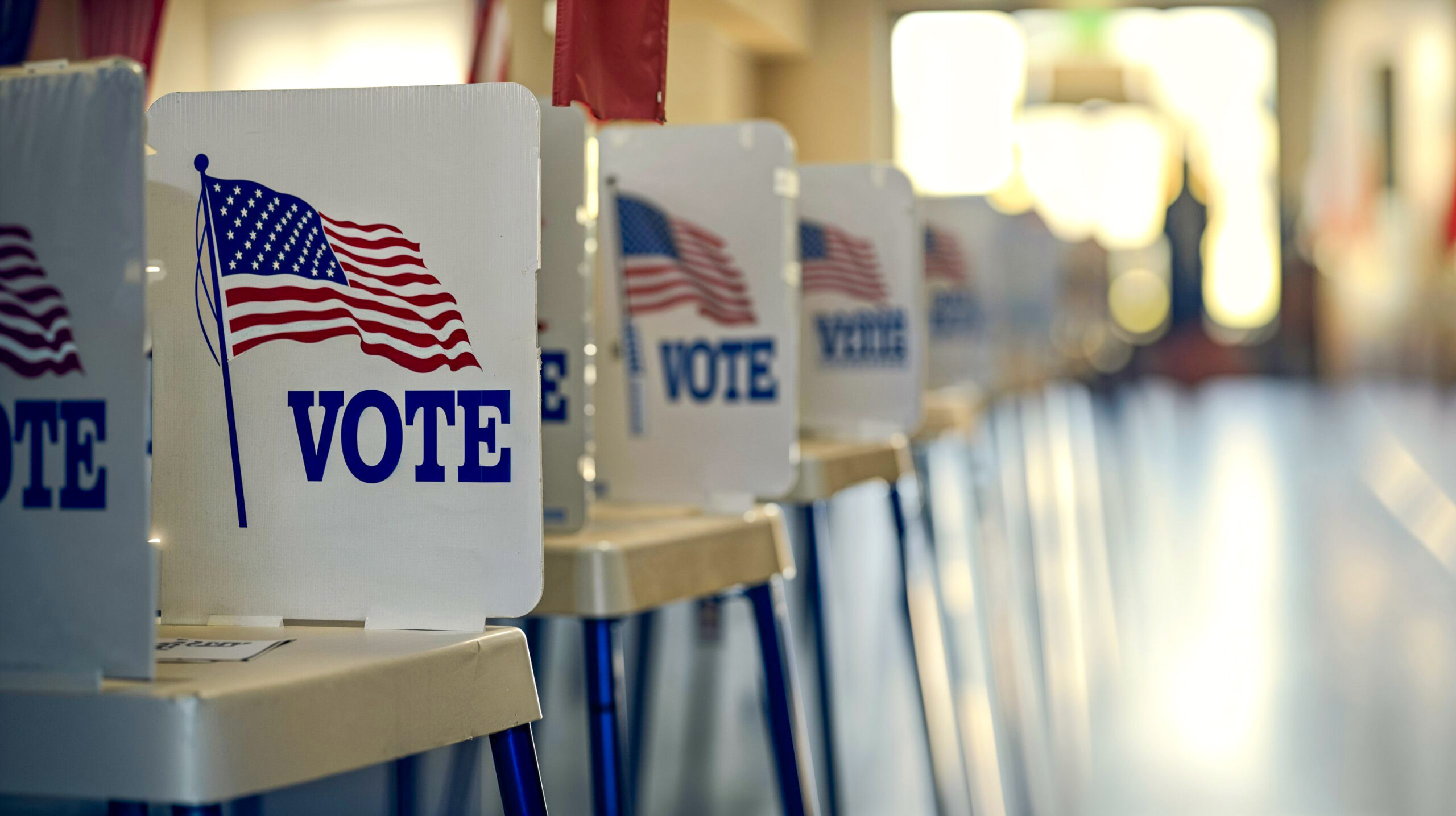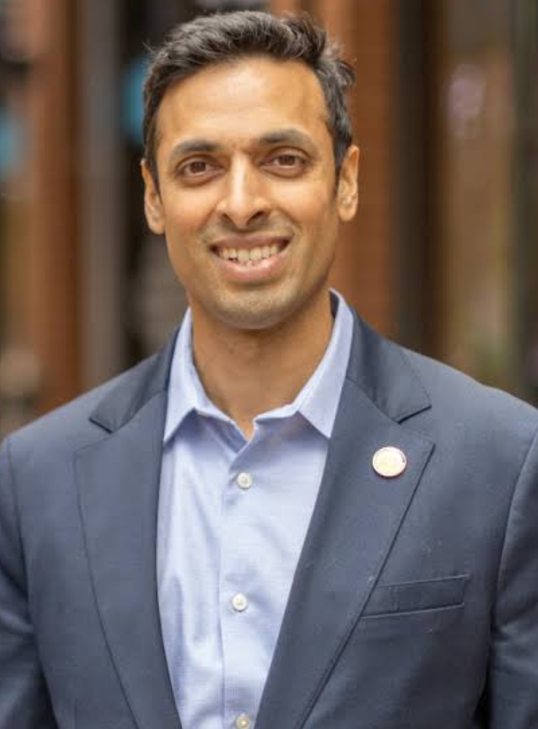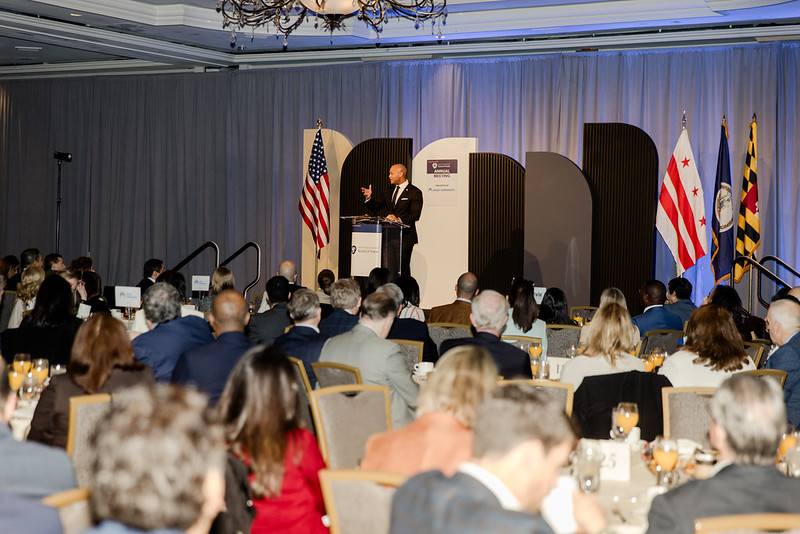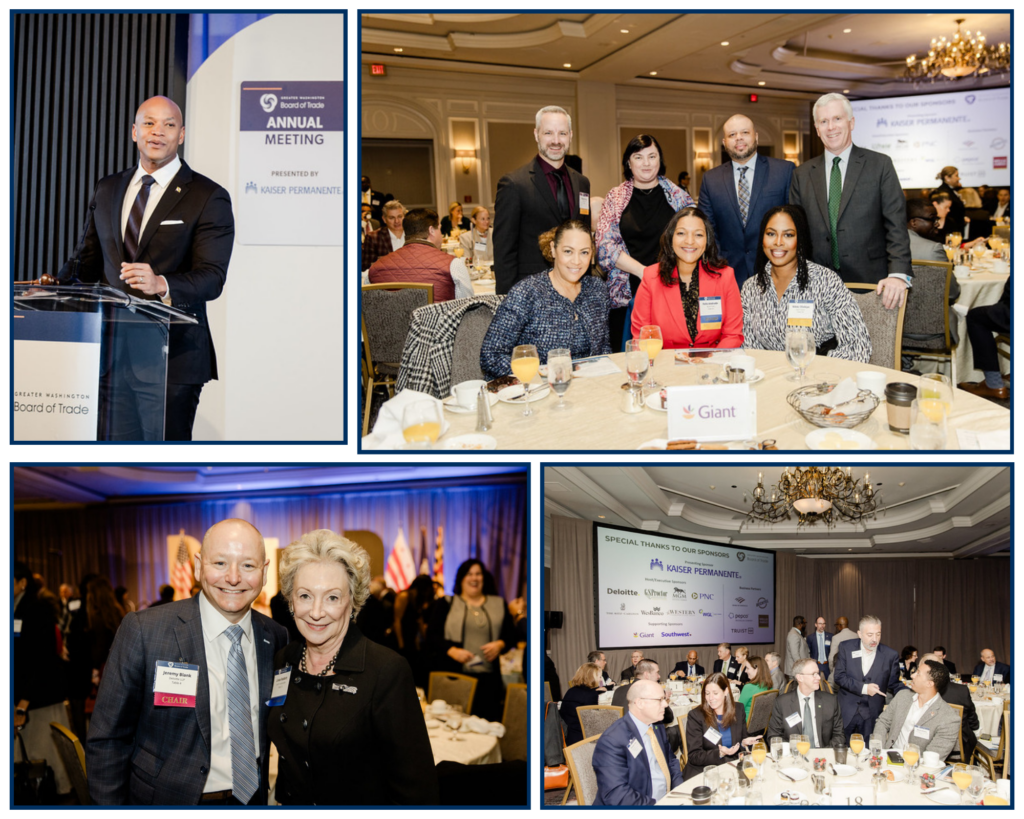The Board of Trade remains focused on advancing the priorities that matter most to Greater Washington. This March newsletter shows a variety of engagements we have had across the region with members and public officials while also showcasing meaningful updates on priorities we are following in the region. We also have a variety of member news updates that showcase regional collaboration!
Category: Member News
DC Water CEO David Gadis Highlights Urgent Infrastructure Needs and Future Solutions
The Board of Trade hosted DC Water CEO and General Manager David L. Gadis on Feb. 26 for an insightful discussion with regional industry leaders. The conversation provided a comprehensive look at the challenges and opportunities facing the District’s water system.
With 80% of the infrastructure exceeding its expected lifespan, including pipes dating back to the Civil War, Gadis emphasized the urgent need to address system vulnerabilities. He warned that a major system failure could cost the region up to $150 million per day in losses, a number that would continue to grow with each additional day of service disruption. Additionally, he highlighted the District’s reliance on a single water source, making it the only major U.S. city without a secondary supply.
The discussion also explored the need for federal approvals and investments to secure additional water sources and storage facilities, such as the Travilah quarry. Securing these alternatives is essential to strengthening the region’s long-term water resilience, and DC Water is continuing to monitor any potential financial cutbacks at the federal level that could impact funding for its projects.
Gadis addressed questions about DC Water’s strategy for maintaining a sustainable and reliable water supply. He stressed the importance of public-private partnerships in advancing key initiatives while ensuring water affordability. He also highlighted ongoing projects like the Lead Free DC Initiative -to replace lead service lines- and the Clean Rivers Project – a large-scale tunnel project designed to reduce pollution and enhance the system’s resilience.
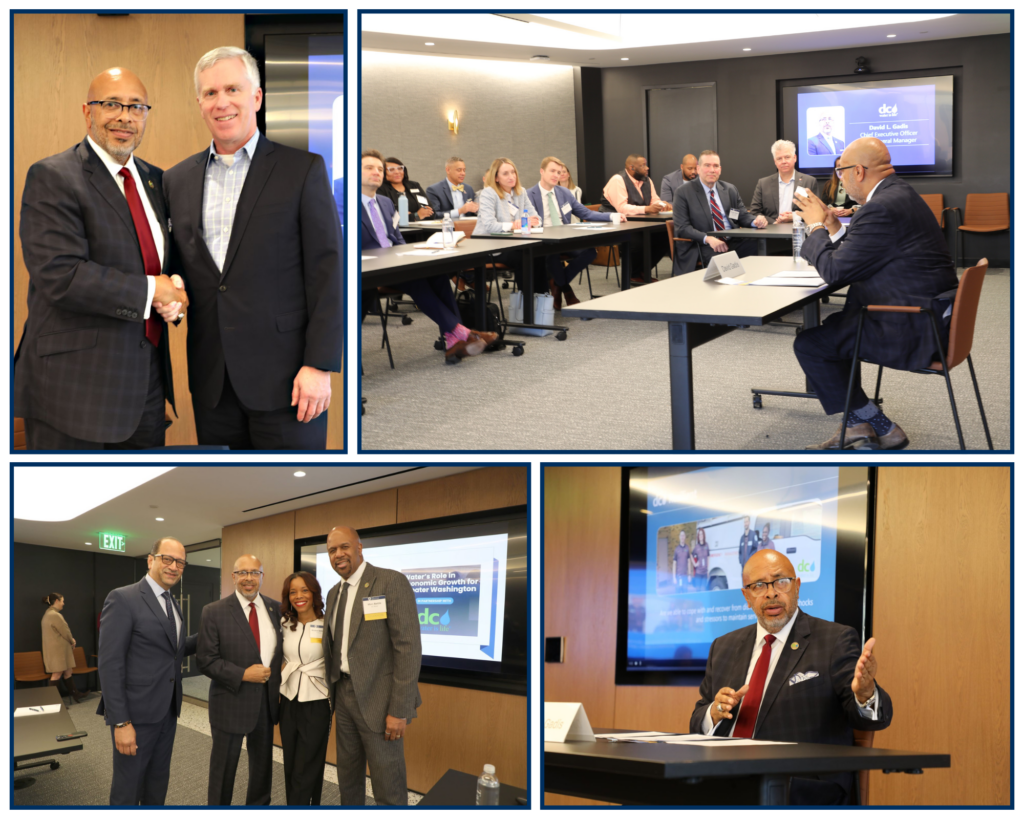
CHECK OUT MORE EVENT PHOTOS HERE
With global challenges like sea-level rise and aging infrastructure, Gadis underscored the need for proactive measures and sustainable practices. Through continued collaboration, innovation, and forward-thinking initiatives, DC Water remains committed to delivering high-quality, sustainable water service to the D.C. community for generations to come.
Gadis also spoke extensively about the importance of D.C.’s Anacostia and Potomac rivers and the ongoing need for effective monitoring systems. He emphasized collaboration with the Army Corps of Engineers and localities in Virginia and Maryland to ensure continued improvements in water quality.
He highlighted the critical role of partnerships in maintaining the health of these waterways, particularly after storms, which require coordinated cleanup efforts along the Anacostia River. He also noted the need for ongoing monitoring of the Potomac River to detect and address potential threats, such as droughts or algae blooms, that could impact water filtration and supply.
In closing, Gadis spoke about his journey to becoming the head of DC Water as a third-generation water utility professional, including his previous stint as the President and CEO of the Indianapolis Water Company. It was an inspiring moment when he shared how his career path has allowed him to help people and serve communities, including helping provide water to more than 700,000 District residents and 25 million annual visitors as the leader of DC Water.
Thank you to DC Water and David L. Gadis for engaging our membership about water resiliency and the need to look at the region’s water systems as a vital economic source that must be invested in and maintained for the future of our communities.
LEARN MORE ABOUT REGIONAL WATER SUSTAINABILITY EFFORTS
GWBOT February 2025 Newsletter
The Board of Trade remains focused on advancing the priorities that matter most to Greater Washington. This February newsletter shows a variety of engagements we have had across the region with members and public officials while also showcasing meaningful updates on priorities we are following in the region. We also have a variety of member news updates that showcase regional collaboration!
Read our February 2025 Newsletter here
Looking Ahead: The Road to 2025 and Beyond for GWBOT Policy Team
The Greater Washington Board of Trade’s Policy team has been busy engaging with key stakeholders, tracking critical legislation, and continuing conversations around crucial initiatives to start the year. As we look forward to an exciting 2025, our policy team is gearing up to tackle a wide range of pressing issues that will shape the future of our community, economy, and workforce. From transportation and technology to workforce development and economic growth, we are committed to addressing the challenges and opportunities that lie ahead.
Here’s an overview of the key issues we’ll be focusing on in the coming year:
Transportation: Budget Negotiations, Autonomous Vehicles, and Regional Connectivity
In 2025, transportation remains a critical area of focus. The Washington Metropolitan Area Transit Authority (WMATA) funding will be a central issue as we work to ensure the sustainability and reliability of the region’s transit network. Securing stable, long-term funding for WMATA is essential for maintaining services and improving infrastructure to meet growing demand, which is an effort that Jack McDougle, President and CEO of the Greater Washington Board of Trade, has played a pivotal role in advancing as the DMVMoves Community Partners Advisory Group Chair for the DMVMoves initiative. The coalition brings leaders in the District of Columbia, Maryland, and Virginia together to develop a unified vision that will deliver a more efficient, reliable, and seamless experience for transit users across our region. Enhancing rail infrastructure can reduce congestion, lower emissions, and improve access to economic opportunities across the region.
Additionally, the rise of autonomous vehicles is poised to revolutionize how we approach transportation, and our team will be monitoring regulatory developments and opportunities for integration. We will continue to advocate for policies and opportunities that support innovation while ensuring safety and accessibility.
Technology: AI, Data Centers, and Digital Transformation
In the technology sector, 2025 will bring an increasing focus on artificial intelligence (AI) and the growth of data centers, which will play a critical role in shaping industries, workforces, and policies across the Washington, D.C. region. As digital transformation accelerates, AI will continue to revolutionize sectors like healthcare, defense, cybersecurity, and education, creating new opportunities and challenges. In tandem with this technological evolution, the region is seeing a surge in the development of data centers, which are essential for supporting the vast amounts of data AI systems require to function effectively. These data centers not only support the AI-driven innovations but also enable the broader digital economy by providing the backbone infrastructure for cloud computing, storage, and high-speed connectivity.
On the heels of President Trump’s recent announcement of an investment of $500 Billion over the length of his presidency, the policy team will remain engaged with stakeholders to ensure that AI and data centers are developed in a manner that meets our region’s growing demands for a robust technological infrastructure such as reducing the digital divide, fostering workforce development in AI and tech sectors, and creating a balanced, equitable approach to inclusive economic growth.
Follow news and updates on policy and legislation in the region on our GWBOT Policy & Priorities web page
Workforce Development: Federal Workforce Return to Office, Public-Private Partnerships, Automation
The return to a full, five-day workweek for federal employees, as outlined in recent executive action taken by President Trump, will have significant implications for workforce development. Our team will monitor the impact of these changes, and we will also continue to support initiatives that foster workforce development, particularly as industries evolve in response to technological and workplace advancements.
Federal workforce initiatives will remain a priority as we work to ensure that government agencies attract and retain top talent in an increasingly competitive job market. This includes advocating for policies that promote professional development and training programs to equip workers with the skills they need to succeed in the digital age, as well as taking a comprehensive well-round approach to what attracts skilled workers to the region including housing affordability, cost of living, and opportunities for advancement.
Economy: Tax Reform, Housing Affordability, and Hospitality
In 2025, our team will also focus on key economic issues, including possible tax reform initiatives in Virginia, Maryland, and the federal government. Recent state legislation in both Virginia and Maryland has proposed tax reforms aimed at easing the financial burdens on residents and businesses, such as efforts to reduce income taxes, automobile taxes, and reform business taxes to encourage investment and job growth. Housing affordability remains a significant challenge, as the D.C. metro area continues to experience high demand as a desirable location to settle in. Meanwhile, the hospitality sector, a key driver of the regional economy, is undergoing change once again as it responds not only to the COVID-19 pandemic but also to the impending return-to-work executive order, which is expected to drive up demand for these services and have an impact on the Downtown DC Revitalization Plan.
As we monitor and engage on these economic issues, our goal will be to ensure that tax policies, housing strategies, and support for hospitality contribute to a thriving, resilient regional economy. Our team will stay engaged with stakeholders to ensure that reforms foster economic growth, improve quality of life, and enhance the D.C. region’s competitive position.
Regionalism: How the Region Continues to Engage with the Federal Government
The Washington, D.C. region is home to a remarkable concentration of federal agencies, business and thought leaders, innovators, entrepreneurs, scholars, to name a few. This unique proximity enables unparalleled collaboration between the federal government, local, and state governments, fostering an environment where policies can be developed, implemented, and refined efficiently. The concentration of federal agencies in this region not only enhances governance and drives innovation, but also generates billions in economic activity, creating jobs and supporting businesses of all sizes. The synergies created by this ecosystem contribute to the broader regional economy, particularly through federal investments.
Projects like the Metro expansion exemplify how these investments can improve quality of life while stimulating economic growth. Furthermore, effective coordination between federal, local, and state leaders ensures that investments in vulnerable communities—ranging from affordable housing to workforce development—reach those who need them most, helping to realize the vision of a thriving, inclusive region. The Greater Washington Board of Trade will continue to work together across all levels of government, to ensure that the Washington, D.C. business community and government can continue to collaborate to maximize the region’s economic and societal impact.
Looking Ahead: The Road to 2025 and Beyond
While these issues are top of mind, our policy team remains vigilant in identifying emerging challenges and opportunities on the horizon. Whether it’s navigating policy shifts or advancing crucial regional efforts, we are committed to adapting and leading the way in shaping policies that benefit our community and economy. In the coming year, we will continue to collaborate with stakeholders, engage in thoughtful dialogue, and advocate for evidence-based solutions that drive progress and innovation. Together, we look forward to making meaningful contributions toward a prosperous and sustainable future.
Virginia gubernatorial candidate Abigail Spanberger meets with Greater Washington’s business community
Former Congresswoman and current Virginia gubernatorial candidate Abigail Spanberger recently engaged with our members in a discussion hosted at our office in Downtown D.C. that highlighted critical issues shaping Virginia’s future.
Spanberger shared her vision to make Virginia the best place to live, work, and raise a family, focusing on workforce development, transportation, housing, and innovation. Her approach emphasizes collaboration between both the public and private sectors in our region to address regional challenges and capitalize on opportunities for growth.
Explore her insights on transportation priorities, technological innovation, and workforce development in our detailed recap below:
Strengthening Virginia’s Workforce
Spanberger underscored the importance of preparing Virginia’s workforce to be ready on day one post-graduation. She aims to prioritize education, workforce training, and initiatives like paid family leave to create an environment where families and businesses thrive. A well-trained workforce, she noted, is the backbone of the economy, driving innovation and growth across sectors.
Transportation and Infrastructure Priorities
Transportation remains a critical area for Virginia’s economic vitality. Spanberger highlighted the integral role of the Metro system, particularly in Northern Virginia, in connecting the region and boosting the local economy. She advocated for sustained funding for regional transit systems like Metro, emphasizing their impact on commuting, tourism, and business operations. Additionally, Spanberger called for a unified statewide strategy on infrastructure, including bridges, roads, and broadband, to ensure equitable development across urban and rural areas.
Affordable Housing and Economic Development
Affordable housing is a widespread challenge in Virginia, affecting industrial, factory, and service workers in both urban and rural areas. Spanberger supports innovative public-private partnerships to increase housing supply and affordability, tailored to the diverse needs of the workforce. Her vision includes leveraging cross-state insights and working with builders to address unique regional challenges.
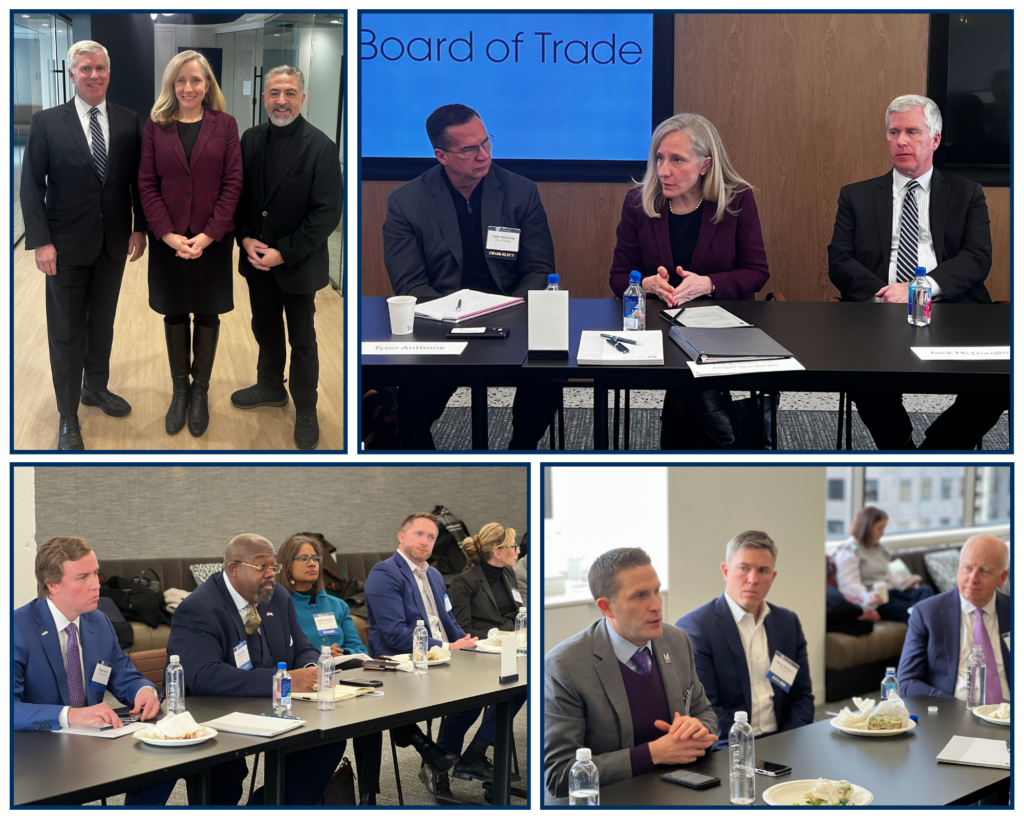
Innovation and Technology
Former Congresswoman Abigail Spanberger sees technology, particularly AI, as a powerful tool for advancing Virginia’s capabilities. She encouraged leveraging AI to streamline operations, identify irregularities, and drive efficiencies across sectors. By embracing AI and other innovations, Virginia can position itself as a leader in tech-driven growth.
Veterans and Second Careers
With its significant military presence, Virginia has a unique opportunity to attract veterans transitioning to civilian careers. Spanberger stressed the need for better communication about resources that are available to veterans through the Virginia Department of Veterans Affairs, ensuring veterans have access to employment opportunities and support networks.
Public-Private Collaboration
Spanberger emphasized the importance of collaboration between government and businesses. From expanding broadband access to addressing workforce challenges, she pointed to public-private partnerships as essential for achieving lasting solutions. Engaging businesses in the legislative process through white papers and research ensures policymakers are informed and equipped to address evolving challenges.
A Regional Perspective
Spanberger also reflected on how federal policymakers perceive Virginia and the Greater Washington region. While the proximity of Northern Virginia to federal institutions offers advantages, it can also lead to regional issues being overshadowed by other priorities. Building stronger relationships between regional stakeholders and federal decision-makers is key to advancing collective goals.
Moving Forward: A Call to Action
Spanberger’s insights underscore the importance of collaboration and strategic planning to tackle Virginia’s most pressing issues. Whether through policy initiatives, public-private partnerships, or workforce investment, her vision offers a roadmap for creating a vibrant, equitable, and innovative Virginia.
More policy discussions with the Board of Trade in the months to come
Thank you to Abigail Spanberger for joining us for this important discussion. We look forward to further policy discussions with leaders this spring and summer, including seperate discussions with both Virginia Lt. Governor Winsome Earle-Sears and Maryland Lt. Governor Aruna Miller. We also have a firstside chat on airtificial intelligence with Don Beyer in early-April.
Upcoming Opportunities for Regional Government and Business Leaders:
Join us for our 105th Mid-Winter Dinner, presented by G.S. Proctor & Associates, Inc., and enjoy an evening of elegance and entertainment at the Washington National Cathedral! This black-tie gala includes a delicious three-course dinner and allows you the opportunity to mix and mingle among the region’s most prominent business leaders and government officials. This is one of our premier networking events that helps our member and partner organizations fully take advantage of the Board of Trade and its connections with the community that we continue to help grow.

Join us for Coffee & Conversation, where member executives engage in interactive, peer-to-peer discussions on timely topics impacting the business community. These conversations play a vital role in shaping programs and policies that drive the region’s economic resilience, workforce development, transportation systems, technological progress, and overall health and wellness.
GWBOT January 2025 Newsletter
The Board of Trade remains focused on advancing the priorities that matter most to Greater Washington. This year, we are committed to tackling a decades-long challenge by working to secure long-term, sustainable funding for the region’s transit system, maintain momentum on public safety to ensure safe neighborhoods and thriving business environments, and build on partnerships like the Potomac Conference to foster inclusive growth and innovation. Our continued efforts to close opportunity gaps will strengthen economic resilience and advance a more equitable and prosperous region.
Read our January 2025 Newsletter here
Inauguration Day Regional Safety & Travel Guide
Stay Safe & Connected on Inauguration Day
Local and federal agencies in D.C. continue their preparations for the 60th Presidential Inauguration on Jan. 20, a pivotal time for Downtown D.C. and the Greater Washington region. This update shares information provided by transportation, government, and business leaders. Pay close attention to the resource links below for real-time information on travel and safety.
View the Public Walking Safety Map provided by Federal Officials
Safety & Transportation Information
Rally ahead of Inauguration Day at Capital One Arena on Jan.19
A rally is scheduled to take place ahead of Inauguration Day at Capital One Arena on Sunday, Jan. 19. According to the DowntownDC BID, which is following a variety of closure and parking information for Downtown residents and businesses, these streets will be closed to vehicle traffic on Sunday, January 19, 2025, from approximately 12:01 a.m. to approximately 6:00 p.m.:
- 7th Street from H Street NW to E Street NW
- 6th Street from H Street NW to E Street NW
- 5th Street from H Street NW to E Street NW
- G Street from 9th Street NW to 7th Street NW
- G Street from 6th Street NW to 4th Street NW
- F Street from 9th Street NW to 4th Street NW
Learn more about the rally from here: https://bit.ly/4gV2evM
WMATA sets route and station closures for Inauguration Day
Beginning Sunday, Jan. 19, until Tuesday, Jan. 21, buses will detour daily due to the 60th Presidential Inauguration and specific Metrorail transit stations will be closed in the Downtown area including Archives-Navy Memorial-Penn Quarter Station, Federal Trianlge Station, McPherson Square Station, Mt. Vernon Square/7th Street-Convention Center Station, and the Smithsonian Station.
Please allow additional travel time and avoid the area if possible. Learn about all the closures WMATA has announced here: https://bit.ly/407R1Rl
D.C. Government & Metropolitan Police Department
D.C. officials and leaders will be on high alert for Inauguration Day and the large number of people and activities going on downtown. Inauguration Day is a National Special Security Event, which helps D.C. get better support from federal law enforcement agencies and the military to keep the District safe. D.C. Mayor Muriel Bowser and her office are helping residents in the region better understand traffic restrictions during Inauguration Day, which can be viewed here: https://bit.ly/4g6bkow
In addition, MPD is working with local and federal authorities to keep people in the downtown area safe and is providing updates here. Please report threats and emergencies to 911. Keep your community safe by reporting suspicious activity by calling 202-727-9099, texting 50411, or visiting iwatchdc.org.
Capital Police:
The National Park Service (NPS) has instituted a partial closure in Lafayette Park and along the White House sidewalks for public safety in support of preparation and activities associated with the presidential inauguration. Closures will remain in place through February 2025. The northern part of Lafayette Park remains open for visitors and First Amendment activities. This year, work began Oct. 1 to accommodate additional time needed for a safer and more secure environment for construction activities. The Washington Post has also confirmed that Capitol Police is working with the D.C. National Guard to coordinate response needs better ahead of Inauguration Day.
For those attending Inauguration Day, review this list of prohibited items on U.S. Capitol Grounds: https://bit.ly/40yZIFO
Expect Closure to Museums on National Mall
Most museums on the National Mall in D.C. will be closed on Inauguration Day to help reduce traffic.
Learn more about these closures here: https://bit.ly/40a8pVH
Advice For Downtown Businesses
Sign up to receive real-time alerts from the District on public safety, traffic impacts, and more on election and inauguration updates by visiting alertdc.dc.gov.
ReadyDC has resources to help businesses create emergency plans, protect critical information, and improve your workforce’s personal preparedness efforts. Learn more by visiting ready.dc.gov/business.
Report suspicious activity. If you see something that doesn’t feel right, report it at iwatchdc.org inform a police officer or call 911 if there is an emergency or you are in immediate danger. Also, keep up-to-date on the latest on Inauguration Day from D.C. Government here.
2024 Year in Review and 2025 Outlook
A YEAR OF TRANSFORMATION
In 2024, the Greater Washington Board of Trade solidified its role as a catalyst for innovation, economic vitality, and regional collaboration. Through more than 120 engagements—including policy initiatives, leadership discussions, and events—we drove meaningful progress on critical issues shaping our region’s future.
From advocating for unified transit and resilient infrastructure to driving downtown revitalization and amplifying the business voice, we delivered measurable impact. However, transformative change takes time, and our work continues.
This success is made possible by you! To our officers, executive committee, board of directors, committee chairs, initiative partners—and all of our members—thank you. Your contributions are the foundation of our success and help shape not only this organization but the future of Greater Washington.
As 2025 nears, the Board of Trade remains committed to uniting leaders around a shared vision for a vibrant, inclusive, and prosperous region.
LEADING REGIONAL PROGRESS
Greater Washington is a vibrant and dynamic place, and its success depends on anticipating trends, addressing challenges, and seizing opportunities to create lasting prosperity. In a time of change and uncertainty, strategic leadership and collaboration are essential. The Board of Trade works to turn these forces into progress, ensuring our region remains a secure, resilient, and thriving place to live, work, and grow. The details on the following pages reflect this commitment to leadership, vision, and action.
Programs & Policy
Through a wide range of activities—including high-impact events, strategic communication campaigns, closed-door meetings with elected officials, support letters, testimony, committee engagements, and more— Board of Trade members spent 2024 working to:
Impact Through Engagement
At the heart of our success lies the power of connection and collaboration. We convene the people and organizations that drive innovation, growth, and resilience across Greater Washington. In 2024, our unmatched signature networking opportunities, strategic initiatives, and trusted networks created space for leaders to share ideas, combine resources, and achieve results that benefit the entire region.
- This year, we welcomed 30 new members and maintained an exceptional retention rate of 92%, exceeding industry standards.
- Our signature events—including the Mid-Winter Dinner, Fall Business Classic, and the Annual Meeting—saw unprecedented participation, with 70% of member organizations represented. At the 7th annual Capital Region Transportation Forum we saw 30% increase in member participation. This level of engagement underscores the strength of our network and the enduring value we create together.
- We tailored sponsorship opportunities to align deeply with member interests and strategic goals. This includes the revitalized TD Bank Morning Star Series—a 17-year partnership—focused this year on navigating a multi-generational workforce. The series featured three sessions that engaged attendees with discussions, workshops, and actionable strategies, illustrating our commitment to meaningful engagement and value creation.
- We revitalized our digital presence by launching a new website, enhancing accessibility and engagement for members and stakeholders. This initiative, combined with a 20% increase in social media engagement, reflects our ongoing efforts to connect and engage meaningfully with our community.
- We amplified our voice as a leader in the region through strategic communication efforts—placing thought leadership pieces in prominent media outlets such as the Washington Business Journal and WTOP. From op-eds on regional economic challenges and public safety, to appearances on Fox5 and at key events like the Maryland Economic Development Association Winter Conference, we positioned the Board of Trade as the go-to resource for forward-thinking solutions that shape our collective future.
2024 New Members
2024 Sponsors
LOOKING AHEAD TO 2025
As we build on the successes of 2024, the Board of Trade remains focused on advancing the priorities that matter most to Greater Washington. In the coming year, we will drive the DMV Moves initiative to secure long-term regional transit funding, maintain momentum on public safety to ensure safe neighborhoods and thriving business environments, and build on partnerships like the Potomac Conference to foster inclusive growth and innovation. Our continued efforts to close opportunity gaps will strengthen economic resilience and advance a more equitable and prosperous region.
The Board of Trade’s strength lies in the engagement and dedication of its members. Together, we have demonstrated what is possible when we align around a shared mission for this dynamic region.
As we look ahead to 2025, we know there will be challenges, but also countless opportunities. And as we have for 135 years, the Board of Trade stands ready.
WELCOME 2025 BOARD OFFICERS
Board members contribute to the Board of Trade’s success in several ways: they weigh in on strategic decisions; assist with the recruitment, retention, and on-boarding process of members; lend resources and make connections to bring projects closer to their goals; attend and support board meetings and other Board of Trade events throughout the year.
JOIN US!
To get involved, connect with our team to explore ways to engage your entire organization. Follow our work—subscribe to our newsletters, connect on X, LinkedIn & YouTube, and visit our newly revitalized website for insights, initiatives, and member highlights. Our events have seen unprecedented demand this year—selling out time and time again—so be sure to secure your spot early and be part of these powerful conversations and engagements.
Not yet a member? Please consider joining us –as a members, as partners for change, or both – the Board of Trade is open for business and eager to team with any organization committed to our common goal of a Greater Washington region.
Newly elected officials across the Greater Washington region
The Board of Trade’s policy team has tracked high-profile elections across D.C., Maryland, and Virginia that help our members and greater business community understand what changes may be coming as policy takes center-stage to start 2025 as chambers open session.
We congratulate the newly elected members of Congress, State Assemblies, and local offices and applaud their commitment to public service and the trust their constituents have placed in them. As the region’s leading non-partisan business organization since 1889, the Board of Trade is dedicated to fostering collaboration on key priorities like transportation, technology, workforce development, and economic sustainability. We look forward to working together to advance initiatives strengthening the Greater Washington region and its business community.
Angela Alsobrooks (D)
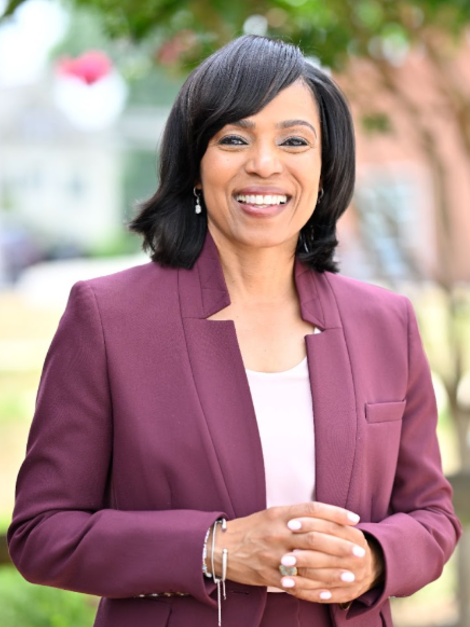
U.S. Senator for the State of Maryland
Formerly the County Executive of Prince George’s County.
Learn more about this elected official.
April McClain Delaney (D)
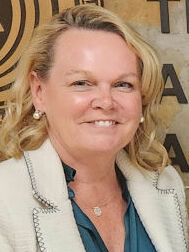
Maryland – 6th District – U.S. House of Representatives
Represents Garrett, Allegany, Frederick, and Washington counties.
Learn more about this elected official.
Sarah Elfreth (D)
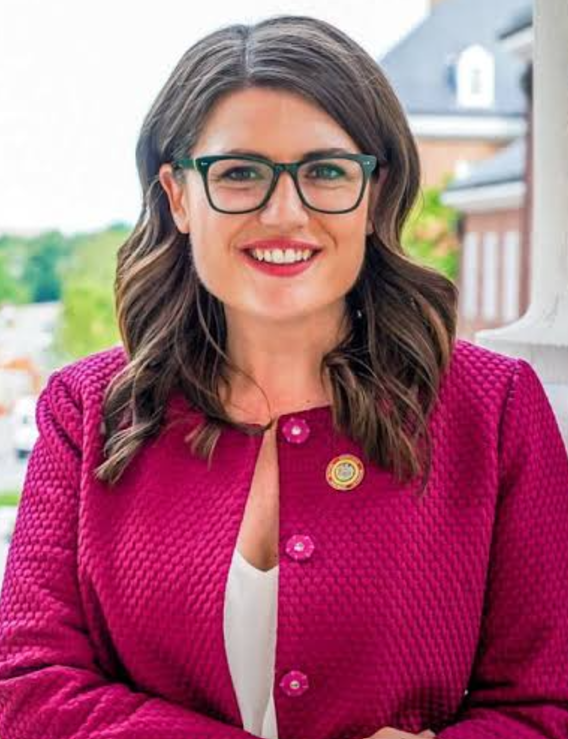
Maryland – 3rd District – U.S. House of Representatives
Represents Anne Arundel and Carroll counties.
Learn more about this elected official.
Wendell Felder (D)
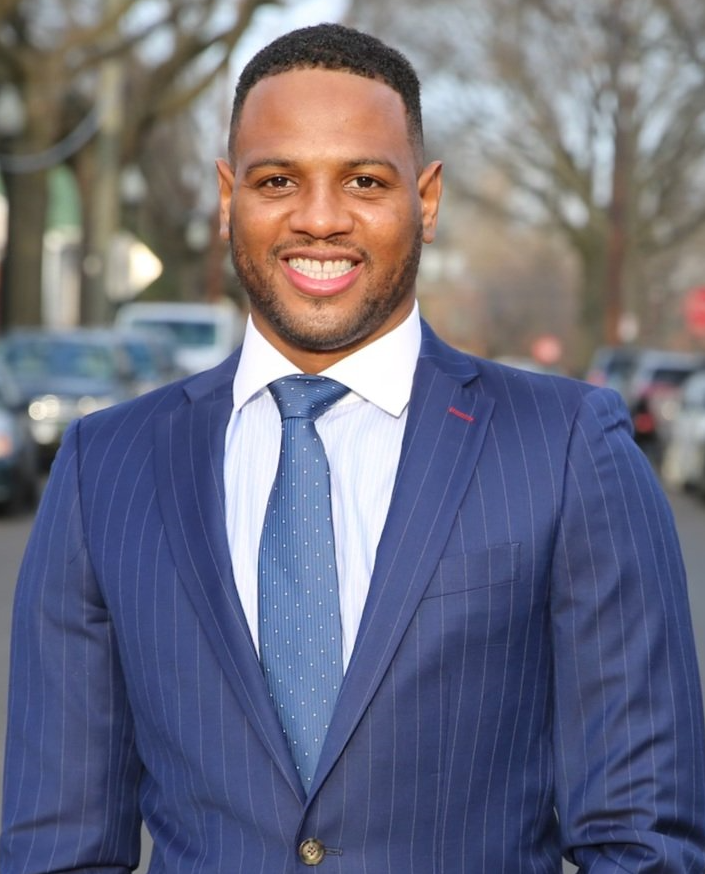
D.C. Council – Ward 7
Represents parts of the Anacostia, Hill East, Stadium Armory, and Deanwood neighborhoods of Washington D.C.
Learn more about this elected official.
Alyia Gaskins (D)
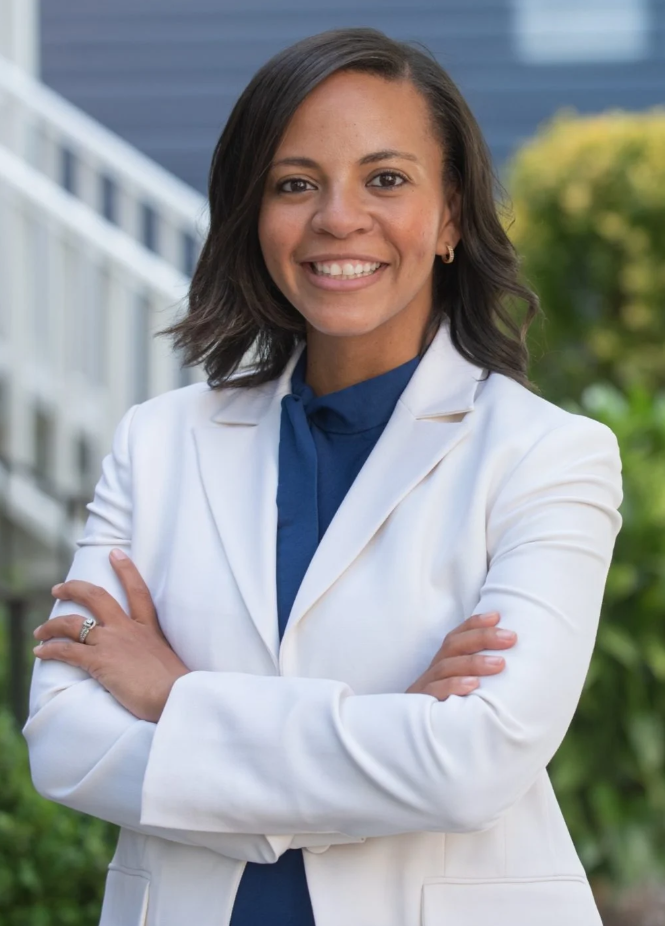
Mayor – City of Alexandria
Learn more about this elected official.
Suhas Subramanyam (D)
Virginia – 10th District – U.S. House of Representatives
Represents Rappahannock, Fauquier, and Loudoun counties. Also represents parts of Fairfax County and Prince William County.
Learn more about this elected official.
Eugene Vindman (D)

Virignia – 7th District – U.S. House of Representatives
Represents Orange, Culpepper, Spotsylvania, Green, Madison, Fredericksburg, Caroline, King George, and Stafford counties. Also represents parts of Prince William and Albemarle counties.
Learn more about this elected official.
Board of Trade hosts 135th Annual Meeting, highlighting successes and future goals
The Greater Washington Board of Trade celebrated its 135th Annual Meeting, presented by Kaiser Permanente, on November 22, 2024, at The Ritz-Carlton in Washington, D.C. This signature event has been a cornerstone of the organization’s efforts since 1889, bringing together members and partners to reflect on the year’s accomplishments and strategize for the future.
Maryland Governor Wes Moore kicked off Annual Meeting by delivering an inspiring keynote address that focused on collaboration and partnerships with the business community that resonated deeply with our commitment to advancing the Greater Washington region. With many of our members operating across this vibrant and ever-evolving area, engaging with state leaders like Governor Moore helps us stay connected and aligned with regional progress.
View More Pictures from Annual Meeting on Flickr
Key Highlights of the Event:
- A Year of Progress and Collaboration: The meeting spotlighted achievements in regional transportation through the DMVMoves initiative, collaborative public safety advancements like the Secure DC Act, and inclusive economic growth efforts, such as Pathways to Prosperity.
VIDEO: Outgoing 2024 Chair Steve Proctor addresses GWBOT membership
- Looking Ahead to 2025: Attendees discussed the strategic vision for next year, including plans to advance economic revitalization and secure key designations to support regional innovation and growth.
VIDEO: Incoming 2025 Chair Jeremy Blank addresses GWBOT membership
- Networking and Recognition: With robust attendance from industry leaders and member organizations, the event served as a premier networking opportunity and a celebration of collective milestones.
VIDEO: Kaiser Permanente’s Israel Rocha addresses Greater Washington business community
The Board’s leadership emphasized the importance of continuing to foster partnerships and maintaining engagement from members to drive initiatives forward. Members were encouraged to stay involved by attending events, engaging with staff, and leveraging opportunities to contribute to the organization’s mission.
Thank you to all our members for contributing to the work of the Board of Trade that helps our region and business community to stay competitive, engaged, productive, and inclusive to all who live and visit!
The Annual Meeting underscored the Board of Trade’s role as a powerful convener and advocate for the Greater Washington region.
In 2025, we anticipate fresh challenges coupled with abundant prospects. Drawing from our enduring legacy in this region, the Board of Trade is unwavering in its dedication to amplifying your achievements and bolstering our region’s competitiveness. We’ll advance this by nurturing stronger connections, advocating more powerfully across federal, state, and local arenas, conducting in-depth analyses, and rolling out specific programs and initiatives.
Stay up to date on Board of Trade events here: https://www.bot.org/events
Thank you to our sponsors for supporting our 2024 Annual Meeting and continuing your support for the Board of Trade and our vital work in the region:
